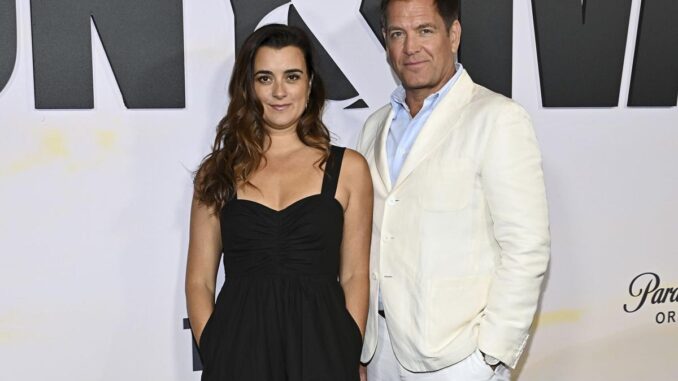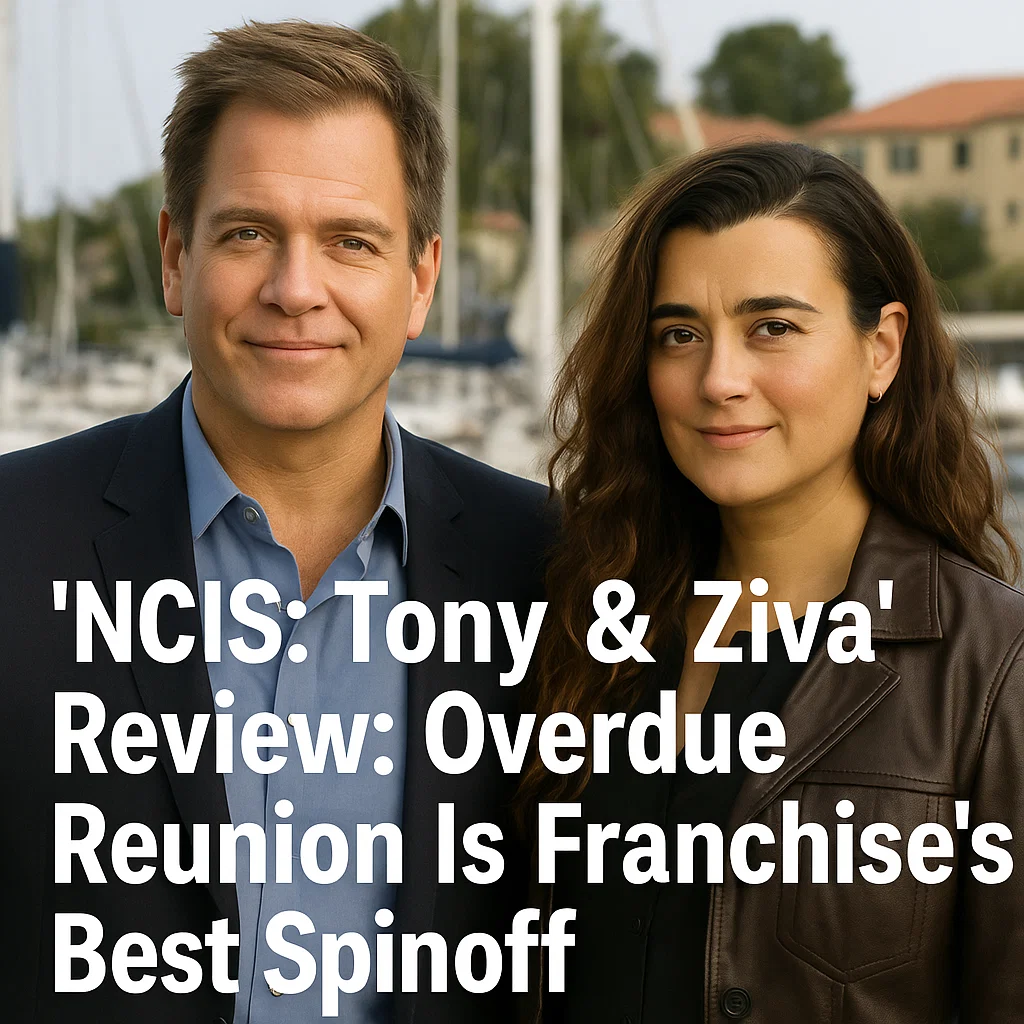
What’s 20 years of waiting for consummation, among friends? That’s how long it took for the long, long “NCIS” flirtation between Tony DiNozzo and Ziva David — played by Michael Weatherly and Cote de Pablo — finally to come to real fruition in the form of the spinoff series “NCIS: Tony & Ziva.” It’s not that the mothership series failed to acknowledge before now that the couple finally got it on; it’s that this was explained as something that’d happened off-camera, after Weatherly and then de Pablo took their leaves from the show in the mid-2010s. But the millions of shippers out there who’d dreamed for two decades of seeing unalloyed professions of affection and actual snogging, on camera, are having their faith rewarded with the second coming of “Tiva,” as they’re unofficially known in fandom.
Is it too little, too late? Certainly this would have had a lot more impact as event TV if it’d been done when the original “NCIS” was still regularly commanding 20 million viewers a week; now, “NCIS: Tony & Ziva” is having its 10-episode run on Paramount+, which is surely going to stir some of the franchise’s oldest fans to finally figure out how to stream. So would 10 years ago (aw, heck, let’s say 15) have been a more ideal moment to unapologetically throw off the shackles and make these two a real on-screen couple? Probably. But the new series delivers the goods so deftly that Tiva fans will have no problem saying “better late than never,” with conviction.
From the evidence of the four episodes that were provided for review, “Tony & Ziva” is the best of the approximately one thousand “NCIS” spinoffs to date. Certainly none of the others have tried like this one does, let alone succeeded, at recapturing the overriding wit that set “NCIS” apart from all the other procedurals when it came into its own in its salad days in the 2000s. At last, it’s a take on the show that doesn’t shrink away from the fact that 90% of the audience is there for the relationships, not the murder-of-the-week. Did any cop show this century have less compelling MacGuffins or better repartee than “NCIS,” at its peak? Happily, it feels as if the new series’ showrunner, John McNamara, mainlined a lot of those early seasons and then gave the franchise a healthy transfusion of that seminal, semi-comedic spirit. All this, and sex scenes, now, too! (Well, at least a light sprinkling of lovemaking. We won’t give away at what point in the show’s many time jumps you see the characters get physical, but rest assured that modest amounts of skin do come to those who wait.)
In just a few instances, the dialogue gets just self-referential enough that it almost risks breaking the fourth wall. The first instance comes in the first minutes of the premiere episode, when Tony, in his new job as a security expert, says to a cohort that he likes to “try to walk that fine line between techno thriller and workplace comedy.” That line doesn’t necessarily seem like something someone would plausibly say, but it’s OK — Tony, and McNamara’s script, are winking at the audience with a reference to how “NCIS” was often described as a cross between police procedural and workplace comedy. Meta jokes aside, it also is meant to immediately tell viewers that this show is not really in the same genre (or hybrid genre) as the original show or its previous spinoffs. The conceit you’ve long had to buy with the “NCIS” shows is that they often had their local crimestoppers heading overseas, thwarting global conspiracies and basically acting like CIA agents. But “NCIS: Tony & Ziva” really has anything to do with the NCIS agency in title only, since its characters are long off the force. A running joke on the new series has the two heroes pulling out their dusty NCIS badges when they need to get in somewhere — with the gatekeepers they run into plausibly wondering what any of this has to do with the Navy, and (less plausibly) just giving them access or info anyway. In the end, this spinoff is what the other series have seemingly longed to be, but couldn’t call themselves without truly betraying their titles: a spy show.

Ziva and Tony aren’t technically spies or cops when the series starts, but old derring-do habits die hard. And the show takes place exclusively in Europe, which serves two purposes: some nice location shooting in Hungary — with a credit for the Hungarian Film Initiative at the close of every episode — and, beyond that, a good explanation for why no one ever gets together with the rest of the old gang in D.C. for drinks or pinochle. (The only other “NCIS” character to be referenced at all in these initial episodes is McGee, fondly and quickly.) DiNozzo is retired from law enforcement and running a security team that’s been hired by Interpol for some critical tasks, only to run into at least one baddie double-agent and possibly more. Ziva is further out of the game, running a language school and getting therapy for all the trauma that NCIS missions and her fellow Israelis put her through years ago.
The daughter that the original “NCIS” thought up to explain the couple’s successive exits back in the 2010s is now a real, albeit minor, character. And once she is threatened with abduction by the villains, Ziva is back in glamorously brutal action to protect her. (“Two words: Jewish mother,” quips Tony, looking around at the mess after a bit fight scene.) It’s established right away that Ziva and Tony are friendly but romantically estranged co-parents who’ve found Europe to their mutual liking, but the exact nature of how their relationship changed over the last few years reveals itself in copious flashbacks. Finally, Ziva lets a friend, and the audience, know the full recent course of their situationship: “on again, kind of off again, and where we are now, never again.” Which, thankfully for fans of all things smoldering, means imminently likely to fire up again.
This is the first “NCIS” show not to have an ensemble cast, which is a good thing, when you have leads capable of demanding all the attention you can give them. But there are some good supporting turns, starting with Henry, Tony’s main Interpol contact, who appears from early episodes to be a good guy the leads are mistaking for a bad guy, although nothing is completely conclusive there right away. In this buttoned-up, perpetually nervous spy-boss role, James D’Arcy looks and seems like the perfect genetic combination of Ralph Fiennes and Benedict Cumberbatch. There’s no such ambiguity about the more obvious Interpol villain, Martine (Nassima Benchicou), who smirks just enough when conducting evil deeds to remind us just how agreeably silly and old-fashioned all this is — or maybe it’s the fact that the characters keep calling her “Mean Lady,” which is more bluntly funny than it sounds.
There’s also some good fun to be had with the overly humorous performances offered by hackers-turned-helpmates Boris (Maximilian Osinski) and Fruzsi (Anne-Marie Waldeck), who, for characters that are initially grating, go on to be allowed a surprising amount of solid one-liners; the series, wisely, does not limit its wisecrackers to just Tony and Ziva. When they’re not tracking the world’s spies, Boris and Fruzsi are supposed to be getting married, and the heroes intend to use that as bait to lure Martine. Complications ensue and, hidden by a big veil, Ziva steps in as the pretend bride to keep the trap alive. That’s actually where we first meet Tony and Ziva, in the very first short scene, with (this should not be a big spoiler) a fake-out in which about a half-minute is spent fostering the illusion that it might be the title couple’s own marriage. Not to worry: even at this accelerated pace of ramping up the relationship, it’d surely be years more of “Tony & Ziva” getting to that point.
One of the kind of meta moments comes when Ziva, pretending to be more of a romantic partner to Tony than she is in the present moment, tells another couple, “We’ve never had any problems with chemistry.” De Pablo and Weatherly give good banter here, as they always have; there’s a reason that they got compared to romantic screwball-comedy pairings of yore from the time “NCIS” first had them flirting, and that’s undiminished now.
It’s clear enough after all this time that Weatherly is the one who naturally tends more toward suave comedy (think James Bond with a massive goofball streak), and de Pablo is a more inherently dramatic presence (as you’d hope someone playing a former Mossad assassin would be). But there’s fun and finesse to the eternal dance they do that brings them to the middle ground where tenderness suddenly seems like DiNozzo’s overriding quality, and Ziva delivers zingers or even breaks into a giggle in a way that doesn’t undercut the deadliness or PTSD of her character. Their eye contact is off-the-charts good. The rest of them has held up pretty well, too; producers did not wait so long to do a “Tony & Ziva” spinoff that their shared sex appeal doesn’t feel like it’s picking up just where it left off.
The character beats they get are testament to how much not just McNamara but the writers and directors of the following episodes have studied old episodes. The very first sight of Tony is him diving through a window, then immediately donning a tuxedo. It seems like a nod to the pre-credits sequence of “Goldfinger,” or could that be coincidental? Nah — not very long later, Tony is referencing his Bond obsession, complaining about the generic name of the secret drone-control computer program everyone is battling for here. “People just don’t put elbow grease into names anymore,” he laments. “If Ian Fleming were working today, ‘Thunderball’ would be called ‘Stolen Missile.’ ‘Man With the Golden Gun’ would be .. well, ‘Man With the Golden Gun.’” But he digresses.
Weatherly gets a majority of the standout lines, as has always been his wont: “I like to eat my crow glazed with a side of broccoli,” and that sort of thing. Ziva’s are usually a bit more to her point: “I feel like I’m pulling teeth, which, by the way, I’m not above.” If all “Tony & Ziva” had to offer was this kind of badinage, it’d be good and goofy enough. But as the episodes progress, beyond getting sexier, they also offer what come as surprisingly touching moments. If you take their relationship at all seriously — which, admittedly, can seem like a questionable approach — there’s an underlying sadness to their trying very hard but not quite getting it together after all these years, long after the unnecessary “Moonlighting” constraints have been taken off.
“We goddam deserve it,” they tell one another, at one point. Their perpetual “it’s complicated” relationship seems less and less contrived and more realistic as it goes along, in the middle of a series that is otherwise going for anything but realism. If you can relate to any of those complications at all, you might even have a shiver of recognition, in the moments where “Tony & Ziva” bucks the odds and treats its wiseacre superspies like real people — which it does for far more extended stretches than “NCIS” ever allowed them. Tony tells Ziva, “I’m always happy to be the good cop,” reassuring her after a PTSD overreaction nearly leads to violence. Hearing that throwaway phrase used as a metaphor for what the otherwise gonzo “Tony & Ziva” is subtly laying out as the dynamics of true love is almost worth the 20-year wait.
The first three episodes of “NCIS: Tony & Ziva” are now streaming on Paramount+, with new episodes released weekly on Thursdays.